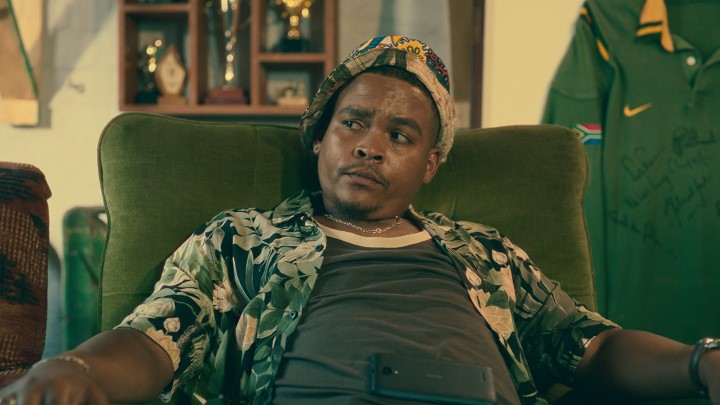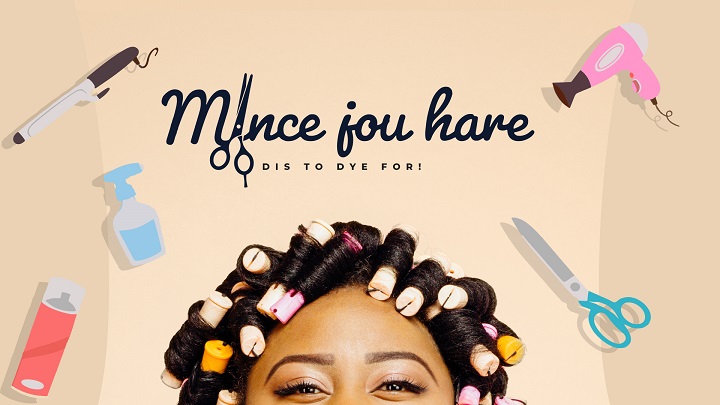Gershwin Mias has been a fan favourite in the first season of Mince Jou Hare as Frieda’s neighbour Oompie who is part assistant, part permanent house guest, and part handyman, but always there to cheer everyone on.
Since his breakout role as Zane in Arendsvlei, Gershwin’s been on a roll. At Silwerskerm last year, he won Best Actor in a Short Film for Die Blokkie. At this month’s festival, he’s up for both Best Supporting Actor in a Drama and a Comedy, for his performances as Kaliel in Die Byl and Sean in Magda Louw respectively. He’s also had strong roles in some of the year’s biggest Afrikaans TV series, from Juffrou X to Skemergrond.
Mince Jou Hare S1 is now available to binge on Showmax. Inspired by the true story of Shimmy Isaacs’ mom, the feel-good sitcom tells the story of Frieda, who quits her factory job to set up a hair salon in her home, changing the lives of her family, neighbours and clients in the process.
The Showmax Interview
Caryn Welby-Solomon for Showmax caught up with the rising star for a Q&A to find out more about Mince Jou Hare and why he’s having a moment.
Congrats on your two Silwerskerm nominations. How did it feel when you got the news?
Thanks. I was so ecstatic: excited and also very grateful at the same time. It was like a rush of emotions because for me it’s a big deal that I finally am getting the recognition. I always say: obviously, winning something is always nice, but, for me, the nomination is a great win. All the nominees that I’m in the categories with are phenomenal people. I’ve met some of them and I’ve looked up to most of them.

You can move fluidly between comedy and drama. What do you find more challenging?
I got all that drama training from a very young age, so I’m one of those who thought that it’s easier to do comedy as opposed to drama – but now I think that’s a myth. It’s a genre on its own and it’s a technique not all artists can achieve. For me, personally, comedy is very difficult. It’s challenging and demanding to get the right comic timing, but I enjoy doing it.
For me, it was a great privilege to be considered to be part of Mince Jou Hare, because I know it’s very dear to Shimmy Isaacs. It’s the story of her mother, like Magda Louw, which Desiré Gardner also wrote about her mother.
To be honest, when Shimmy approached me with the idea of Oompie, I was sceptical in the beginning. I wasn’t 100% confident in playing it; I didn’t know if I could do comedy the way that she wanted. But after getting advice from Shimmy, I did the audition – and Showmax and Penguin Films immediately said, “Yes, that’s what we wanted.”
How does Mince Jou Hare feel different to what you’ve worked on before?
With Mince Jou Hare, there was this creative freedom. I think that was also thanks to Shimmy Isaacs, because she gave me, and the rest of the cast, a freedom of play. We would come with a proposition to the floor and then the director, David [Isaacs], would say, “Less of that; more of that.” He would tune it. It was nice to be able to play; it was almost like a theatre piece on camera. On top of that, it’s a comedy, so we all had fun doing it.
ALSO READ: Mince Jou Hare Sitcom is To Dye For
Oompie is so unexpectedly wise. What do you enjoy about playing him?
I really enjoyed playing Oompie, because it felt close to home. We all know someone like that in our community.
Oompie is very outgoing, an extrovert, a know-it-all – or that’s what he thinks. But he is also very innocent. I don’t think he tries to be funny; he just appears that way without trying.
Oompie is one of those characters where what you see is not necessarily what you get. There’s much more going on there.
His intentions are always pure. He always tries to help and his hustle is innocent. He wouldn’t steal; he would rather come up with brilliant or impractical ideas. He is the kind of guy that anyone can trust. And he’s like furniture in Frieda’s house and that was nice to play around with.
Why do you think people should watch Mince Jou Hare?
I think many people can relate to Mince Jou Hare because it’s very familiar to brown people: it’s a story out of our communities. Every character comes with that bit of magic that they bring to the table but, at the end of the day, it tells one big story. And that is the value of our people, and especially of our parents. It shows the sacrifices they make; what we as children don’t necessarily see. I think that, even though it’s a comedy, the truth comes out better when we can make people laugh.
Gershwin Mias Talks About His Other Roles
What would you like to do next?
I’ve always known that I want to be more than just an actor. I want to direct. I want to write. I want to create. I want to produce. Long term, that is my goal: to be more involved behind the camera, to be more involved with the suits. I want to be a decision-maker and a person who gives opportunities to others.
What was your experience like playing Sean on Magda Louw?
Magda Louw tells the story of Magda and her husband Gerard. It’s a mockumentary that was written by Desiré Gardner as a one-woman show that she did based on her mother. Then it evolved and got picked up for a TV movie, and, after that, a series. We were very blessed in that manner.
As Sean, I’m part of a broadcasting team and crew. So I go to their house and I document their daily lives and I do confessionals with them. And then all kinds of twists and turns happen.
Sean is that character that starts as a crew member, who enters their life and their house, and then he becomes a family friend, and, in the end, he becomes a part of the family.
Sean wasn’t necessarily the comic relief in the show, so I was very surprised when I was nominated for Best Supporting Actor in a Comedy for the performance. I give that credit to Desiré Gardner; she brings the text alive with her writing. It was very well written, so I think that made the process easier for me.
Tell us about your role of Kaliel in Die Byl. Why do you think it resonated like it did?
Kaliel wasn’t a very transparent character but, from the surface, he looked like a guy you can trust. He looked like a friend, the neighbour next door, a colleague at work. He was very quiet and not in a very mischievous or evil way, but very reserved, and introverted. They were always like, “He’s just chilled.” So the audience put their trust in him – but he’s very complex, one of those characters with a lot of meat on them, so it was a nice challenge.
ABOUT MINCE JOU HARE
The inspiring small-town comedy is directed by Spinners star David Isaacs, co-creator of Joe Barber and G.I.L. Roberta Durrant produces through Penguin Films, the company behind International Emmy nominees Stokvel and Home Affairs; classic SA comedies like the Rose d’Or nominee Madam & Eve and triple SAFTA winner G.I.L.; and long-running dramas Arendsvlei and Sara Se Geheim.
Opposite Gershwin, Mince Jou Hare stars Melissa de Vries as Frieda; comedian Dugald Pieterse as her husband, Vincent; Fleur du Cap nominee Bianca Flanders (Troukoors; Nêrens, Noord-Kaap) as her best friend, Julia; and Franka Kirby in a breakthrough role as her daughter, Jody.







